

Planet Project. Mars. Covid 19. Year 11 Practical Science. Climate Change. It's too late for Earth. Fossil Fuels, it's exhausting! DNA. Plastic Pollution. Year 10 : Theme park rides & physics. Busting the fat myths: How new research will revolutionise Māori and Pacific health. Bigger not fatter Another variant, known as CREBRF, which is found in about 30% of Māori and Pacific people but not in Europeans, is associated with higher BMI – usually a measure of obesity and associated ill-health.
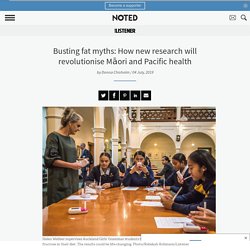
However, the variant is remarkably protective against diabetes, and recent unpublished research from the MWC indicates that the higher BMI is the result of more muscle, not fat. Mega mast: the forests left unprotected. Environment There are fears that threatened species might go locally extinct on 300,000 hectares of top-priority native forest, David Williams reports.
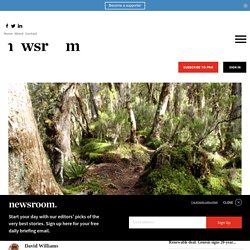
The prospect of a pristine Southland forest being clear-felled spurred the Government into action in the mid-1990s. The Waitutu forest block, 2171 hectares of podocarp forest near the Fiordland National Park, is a lowland wilderness rich in mistletoe and birdlife, including the largest known population of South Island kākā, a rare parrot. The wider area, set on a series of uplifted marine terraces, was a state forest that was added to the national park in 1999. Weather and climate resources for World Meteorological Day 23 March. Can You Spot Bad Science Reporting? Look out for Crazy Claims If the claim sounds too good to be true, it probably is.
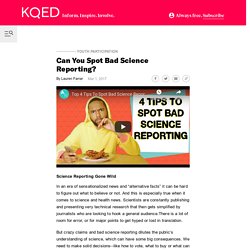
Look out for words like “cure,” “breakthrough,” and “study proves.” Those are all signs that the story might be hyping the science. Analyze SourcesWhat sources does the story cite? Are they referencing other news outlets? If so, like a game of telephone, it’s easy for science to get misconstrued as it trickles down from scientists to public relations people to the press. Determine Outside Expert OpinionsDoes this news story ask outside experts to comment on the research? Just make sure the experts being interviewed are actually qualified to talk about the topic. TEACHERS: Get your students in the discussion on KQED Learn, a safe place for middle and high school students to investigate controversial topics and share their voices.
INTERACTIVE: Data and Documents Who's Afraid of Peer Review? ARTICLE: Untangling Media Messages and Public Policies (Understanding Science) A ban on Predator Free using gene editing technology labelled a 'handbrake' on conservation by MP. Govt blocking breakthrough technology that could make New Zealand predator-free. Gene editing in primary industries – Expert Reaction - Science Media Centre. A new discussion paper evaluates the potential uses of gene editing for New Zealand’s primary industries.
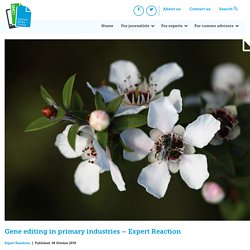
New Zealand has historically had a conservative approach to gene editing, but embracing gene editing technology could allow us to create disease-resistant mānuka honey and remove certain allergens from milk, a new Royal Society Te Apārangi report says. This discussion paper – the third in a series from the Society’s Gene Editing in Aotearoa project – states gene editing could bring a range of benefits for our agriculture, horticulture and forestry sectors, zoning in on apples, mānuka, ryegrass, wilding pines, and dairy cows. The Society is seeking public feedback on the paper and holding three workshops around the country this month to discuss the findings. The report was covered by a number of local media outlets. Why NZ shouldn't be waiting to tackle methane. A major new study shows the amount of methane in the atmosphere has been rising since 2007 – and it's not slowing down.
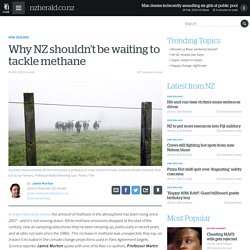
While methane emissions dropped at the start of the century, new air sampling data shows they've been ramping up, particularly in recent years, and at rates not seen since the 1980s. This increase in methane was unexpected, they say, so it wasn't included in the climate change projections used in Paris Agreement targets. Science reporter Jamie Morton spoke with one of its Kiwi co-authors, Professor Martin Manning, about what this means for New Zealand and its methane-heavy greenhouse gas inventory. Your new paper found rising methane levels in the atmosphere could threaten the Paris Agreement's goal to keep temperature rise below 2C.
Animal Pests (New Zealand) An animal becomes a pest if it begins to cause considerable economic or environmental damage.
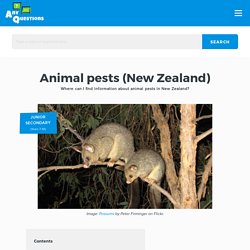
Animal pests such as stoats, possums, deer, cats and mice were introduced to New Zealand causing the decline in number and sometimes the extinction of the native birds and animals. The government has had to spend millions of dollars to control these pests in New Zealand. Animal pests of New Zealand Here is a list of some pests that have been introduced to New Zealand by early Māori and Pacific navigators, including early European settlers. Possums: Brought in from Australia to establish a fur industry in New Zealand. Welcome! — Science Learning Hub. Genetic Modification. Genetic modification (GM) takes place when selected genes are taken from one organism and transferred to another organism to change its characteristics.
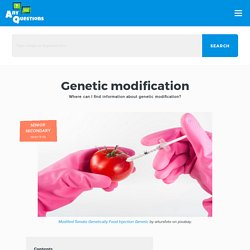
This process is often called genetic engineering (GE) which is is type of GM that can be done naturally or artificially. In this entry we'll show you where to find information about how genetic modification works, the technologies involved, New Zealand laws around genetic modification and the controversy about it's safety and benefits. What it is genetic modification? Genetic modification,genetic engineering, manipulation, editing, splicing, biotechnology and frankenfoods! Science Journal for Kids - Science Articles for Kids and Teens. How genetic modification helps the Impossible Burger take flight. Scientists are building an animal fart database. Topic Explorer. The Science Of…